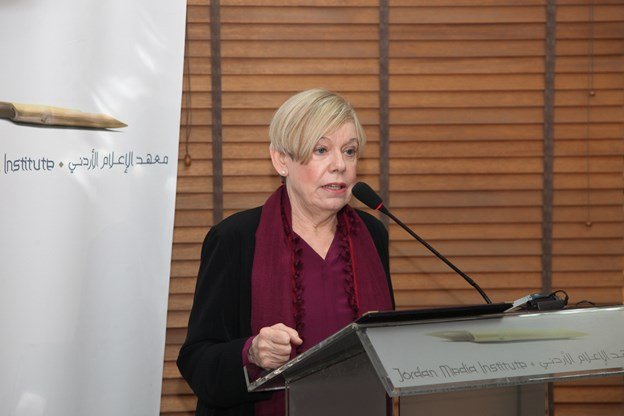Image:

01 Feb 2015
26 January 2015 <br />
<br />
Renowned British author and religious thinker, Karen Armstrong said the world was in a dangerous state due to lack of compassion and dialogue.<br />
<br />
Addressing students at the Jordan Media Institute (JMI) today, Armstrong highlighted the crucial role that a compassionate media can play in achieving peace. She said that unless people treated others as they wish to be treated, they would destroy each other and the world would not be a viable place. “I’m filled with dread, because I see us headed on a perilous path”, she warned.<br />
<br />
During a lecture, entitled “Compassion: the Challenges for the Media in the Globalized World”, Armstrong said the media was increasing the gulf between Islam and the West as was evident during the recent shootings in France which killed 17 people. The media focused on the attack on the satirical magazine Charlie Hebdo and paid little attention to the massacres of 150 Pakistani children and teachers and more than 2,000 Nigerians.<br />
We must start honoring others’ dead as we do our own, she added.<br />
<br />
While defending free speech as sacred in the West, the author of the international bestseller A History of God urged journalists to show compassion, be vigilant and responsible and beware of stereotypes. She warned against encouraging a sense of omniscience, urging members of the media to make peace rather than prejudice and to know their own and others’ culture and history. <br />
<br />
The lecture, which was also attended by Her Royal Highness Princess Rym Ali, founder of the institute and Dean Basim Tweissi, also highlighted the role of the nation state in creating conditions and focusing on culture, language and ethnicity in order to justify violence against others who do not fit the national profile.<br />
<br />
She then responded to students’ questions and warned against state violence. She explained that in World War I the number of innocent civilians killed was around 5%, while in World War II they constituted 66% and now the figure is estimated at more than 90%. She urged journalists to document civilian casualties.<br />
<br />
There is an anti-Islam sentiment in the West, she said, noting that when she wrote positively about Islam she received death threats and was flooded by hate mail. However, those seeking change must not give up, because people are ready to listen, she added.<br />
<br />
Regarding the Islamic State, Armstrong said the movement was counter Islamic, but very modern in its approach to killing, which is an experience of the modern world, and it is well-funded. She added that all extremist movements are expressing a wide-spread unease with the nation state and fear of annihilation.<br />
<br />
The recipient of several awards for her efforts to promote inter-faith understanding, Armstrong was in Amman at the invitation of the Jordan Chapter of the Charter for Compassion, a document she created with the aim of spreading the ideal of compassion in the world. The charter was crafted by leading thinkers and activists in Islam, Judaism, Christianity, Hinduism, Buddhism and Confucianism.<br />
<br />
The former nun whose latest book is Fields of Blood: Religion and the History of Violence concluded her remarks by telling JMI students that Jordan was on the frontline of many of the troubles that are tearing the world apart and needs journalists to make the world a safer and more peaceful place. She described the institute as a fantastic setting that provides students with a rare opportunity to study to be good responsible journalists. <br />
<br />
To watch the video ... <a href="http://www.youtube.com/watch?v=iE-j3Y0pMcw">Please Click Here</a><br />



